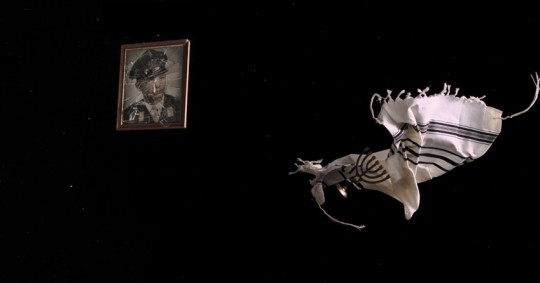Conditions of Political Choreography
16 Jun - 16 Jul 2017
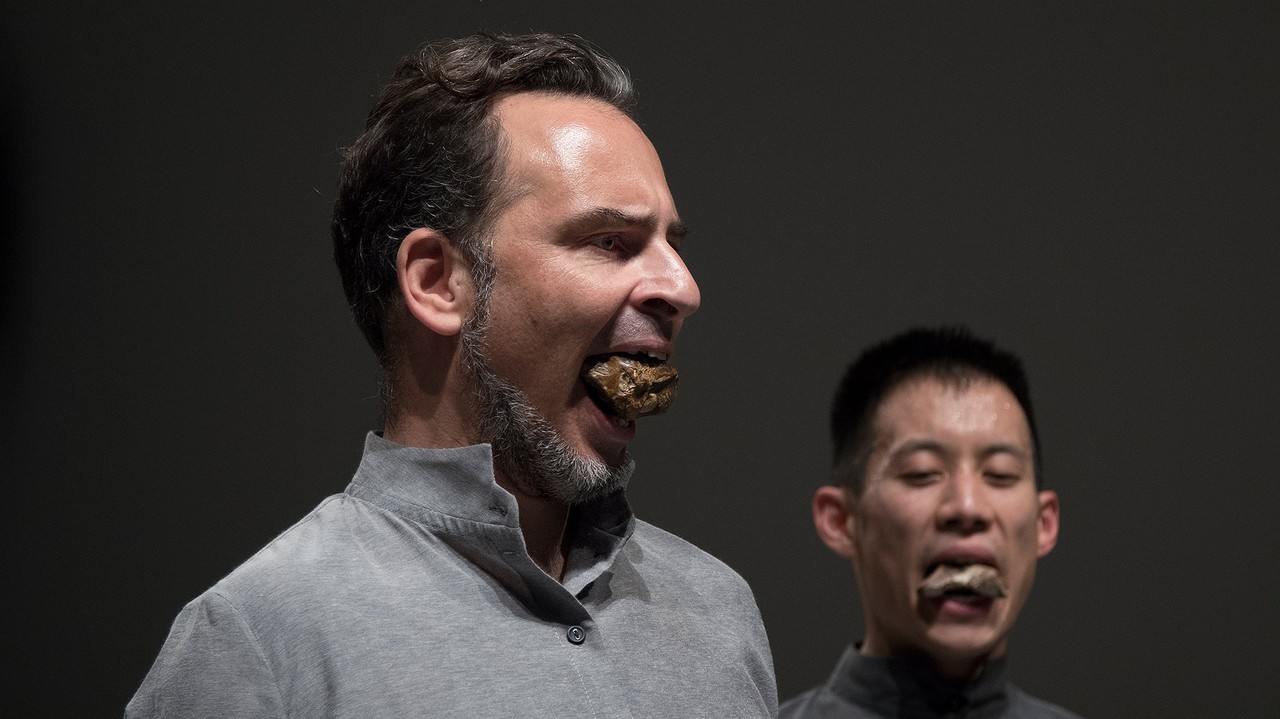
Ohad Fishof / Noa Zuk
The Burnt Room (2016), dance performance, Center for Contemporary Art, Tel Aviv, 2016 © Asaf Saban
The Burnt Room (2016), dance performance, Center for Contemporary Art, Tel Aviv, 2016 © Asaf Saban
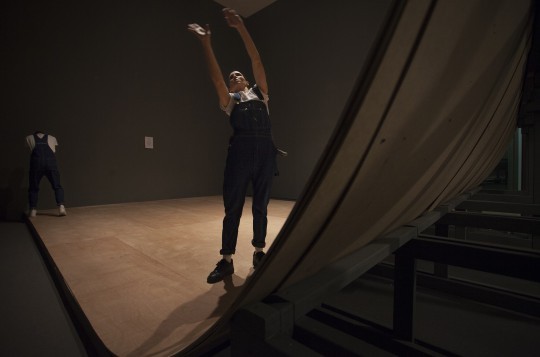
Adam Linder
Some Cleaning (Hand in Hand) (2016), dance performance with Delphine Gaborit, Center for Contemporary Art, Tel Aviv, 2016 © Asaf Saban
Some Cleaning (Hand in Hand) (2016), dance performance with Delphine Gaborit, Center for Contemporary Art, Tel Aviv, 2016 © Asaf Saban
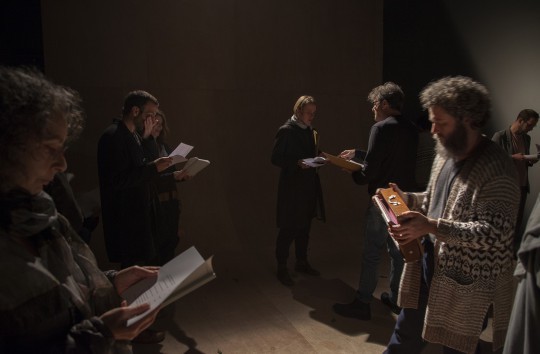
Noam Enbar / Yonatan Levy
Antigone (2016), performance, Center for Contemporary Art, Tel Aviv, 2016 © Asaf Saban
Antigone (2016), performance, Center for Contemporary Art, Tel Aviv, 2016 © Asaf Saban
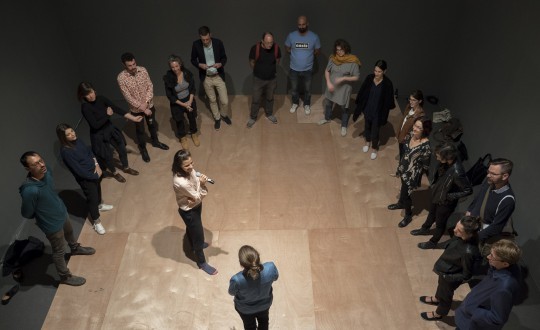
Christian Falsnaes
The Lead (2016), performance by Maya Elran, Center for Contemporary Art, Tel Aviv, 2016 © Asaf Saban
The Lead (2016), performance by Maya Elran, Center for Contemporary Art, Tel Aviv, 2016 © Asaf Saban
CONDITIONS OF POLITICAL CHOREOGRAPHY
16 June – 16 July 2017
Yochai Avrahami, Yael Bartana, Noam Enbar / Yonatan Levy, Christian Falsnaes, Ohad Fishof / Noa Zuk, Michal Helfman, Leon Kahane, Adam Linder, Antje Majewski, Ohad Meromi, Markus Miessen, Susanne M. Winterling
Curators: Marius Babias, Sergio Edelsztein, Sophie Goltz, Chen Tamirr.
Conditions of Political Choreography is a research project and performance exhibition initiated by Neuer Berliner Kunstverein (n.b.k.) in collaboration with the Center for Contemporary Art (CCA) in Tel Aviv, funded by the German Federal Cultural Foundation. International artists working with diverse performative strategies – from the fields of visual art as well as dance, theater, and film – were invited to conceive new works. Over the period of four weeks the artists present their works, every week focusing on a different theme. A spatial intervention based on the concept of New York artist and architect Ohad Meromi structures the exhibition space that becomes a territory on its own and with each performance will be reinterpreted. In 2016, architect and exhibition designer Markus Miessen integrated the two floors of the CCA building in Tel Aviv with a quarter-pipe stage and a book display. In Berlin, the discursive formats “Spaces of Debate” and “Moving Thoughts” provide an interpretation beyond the project’s scope.
While the question of how the shared memory space between Germany and Israel in the 21st century constitutes itself against the backdrop of the Holocaust – and not only that – is one starting point of the project, Conditions of Political Choreography seeks to form a sense of topicality of history in the face of increasing racism and populism in democratic societies. In the light of global migration and local oppression, the project reflects multiple perspectives and the formation of transnational memory contrary to the trend of memorialization. The medium of performance here allows both to mark and to leave a territory at the same time.
Conceived as experimental in its structure and process, the performance exhibition Conditions of Political Choreography is informed by the artists’ common research in Tel Aviv and Berlin. Focusing on the diverse cultural approaches to commemoration politics, the artists find complex answers and manifold perspectives on the political choreography of today. Some look at historiography, like Noa Zuk and Ohad Fishof as well as Michal Helfman, or historical responsibility like Noam Enbar and Yonatan Levy. Others, like Yochai Avrahami and Antje Majewski, examine the formation of territorial narratives via natural landscapes and agriculture, while Yael Bartana, Adam Linder, and Susanne M. Winterling investigate purification rituals and the resetting of personal agency in the face of collective oppression.
Diverse in their themes and approaches, the artistic contributions and accompanying discussions in Conditions of Political Choreography raise questions about the limits of belonging, artistic disciplines and imposed structures. The project challenges the artists to use the given framework to push against the constraints of architecture and performance as a medium. What is the difference between being hosted and being contained (in a specific territory, through geo-politics)? Can collaboration become an end in itself? How, by one’s own efforts, can resistance develop?
16 June – 16 July 2017
Yochai Avrahami, Yael Bartana, Noam Enbar / Yonatan Levy, Christian Falsnaes, Ohad Fishof / Noa Zuk, Michal Helfman, Leon Kahane, Adam Linder, Antje Majewski, Ohad Meromi, Markus Miessen, Susanne M. Winterling
Curators: Marius Babias, Sergio Edelsztein, Sophie Goltz, Chen Tamirr.
Conditions of Political Choreography is a research project and performance exhibition initiated by Neuer Berliner Kunstverein (n.b.k.) in collaboration with the Center for Contemporary Art (CCA) in Tel Aviv, funded by the German Federal Cultural Foundation. International artists working with diverse performative strategies – from the fields of visual art as well as dance, theater, and film – were invited to conceive new works. Over the period of four weeks the artists present their works, every week focusing on a different theme. A spatial intervention based on the concept of New York artist and architect Ohad Meromi structures the exhibition space that becomes a territory on its own and with each performance will be reinterpreted. In 2016, architect and exhibition designer Markus Miessen integrated the two floors of the CCA building in Tel Aviv with a quarter-pipe stage and a book display. In Berlin, the discursive formats “Spaces of Debate” and “Moving Thoughts” provide an interpretation beyond the project’s scope.
While the question of how the shared memory space between Germany and Israel in the 21st century constitutes itself against the backdrop of the Holocaust – and not only that – is one starting point of the project, Conditions of Political Choreography seeks to form a sense of topicality of history in the face of increasing racism and populism in democratic societies. In the light of global migration and local oppression, the project reflects multiple perspectives and the formation of transnational memory contrary to the trend of memorialization. The medium of performance here allows both to mark and to leave a territory at the same time.
Conceived as experimental in its structure and process, the performance exhibition Conditions of Political Choreography is informed by the artists’ common research in Tel Aviv and Berlin. Focusing on the diverse cultural approaches to commemoration politics, the artists find complex answers and manifold perspectives on the political choreography of today. Some look at historiography, like Noa Zuk and Ohad Fishof as well as Michal Helfman, or historical responsibility like Noam Enbar and Yonatan Levy. Others, like Yochai Avrahami and Antje Majewski, examine the formation of territorial narratives via natural landscapes and agriculture, while Yael Bartana, Adam Linder, and Susanne M. Winterling investigate purification rituals and the resetting of personal agency in the face of collective oppression.
Diverse in their themes and approaches, the artistic contributions and accompanying discussions in Conditions of Political Choreography raise questions about the limits of belonging, artistic disciplines and imposed structures. The project challenges the artists to use the given framework to push against the constraints of architecture and performance as a medium. What is the difference between being hosted and being contained (in a specific territory, through geo-politics)? Can collaboration become an end in itself? How, by one’s own efforts, can resistance develop?

